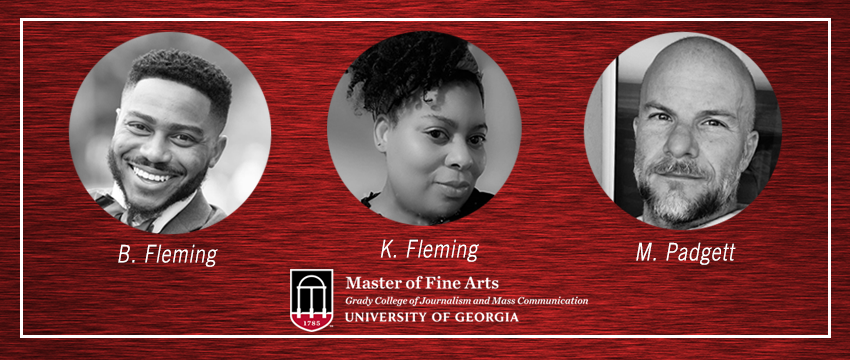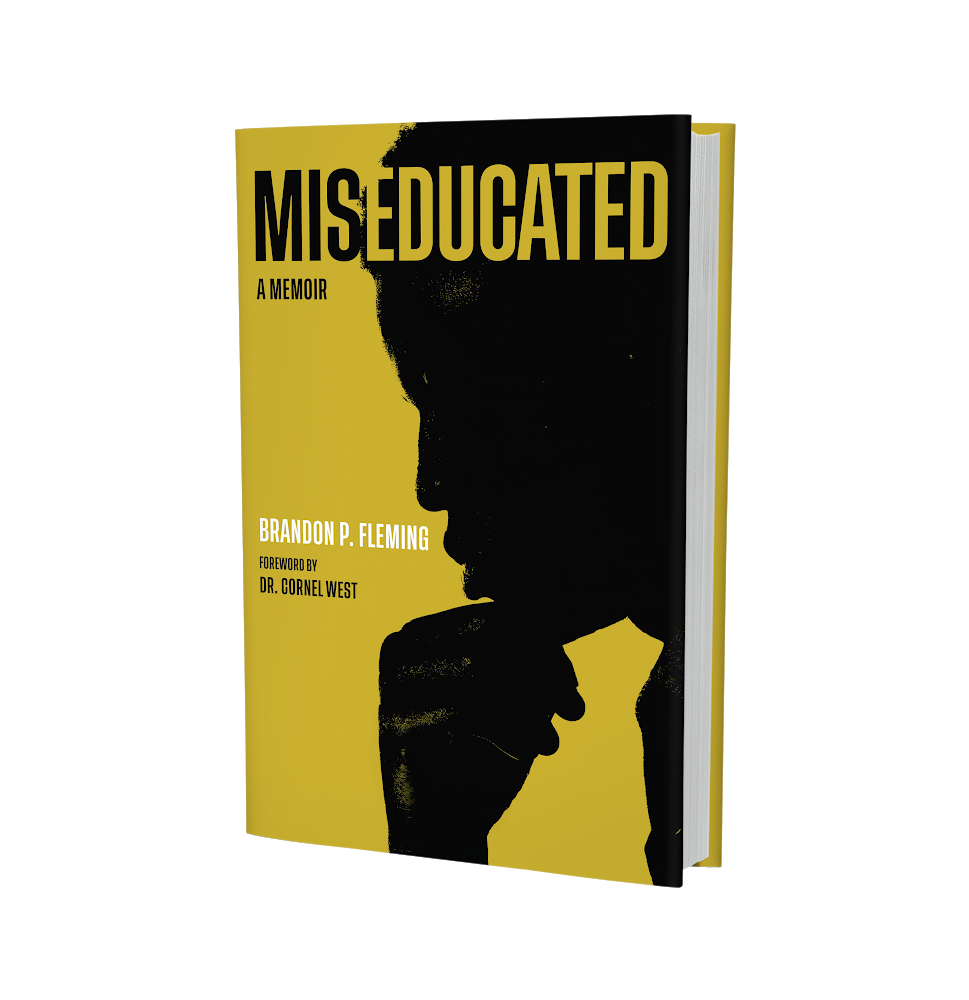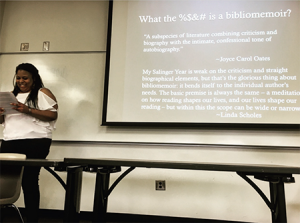Success beyond the MFA Narrative Media Writing classroom

Success beyond the MFA Narrative Media Writing classroom
This is the first of a two-part series discussing a few successes earned by students, faculty and alumni of the low-residency MFA program in Narrative Media Writing. This installment illustrates a sampling of the paths taken by those in the Narrative Nonfiction track. Please view the installment about the Screenwriting track here.
The definition of “success” is subjective.
However, students in Grady’s MFA program in Narrative Media Writing program likely would agree that publishing a book or producing a script is a desired outcome of their degree.
Many students and alumni of the six-year-old program—on both the Narrative Nonfiction and the Screenwriting tracks—have found success.
Program directors Valerie Boyd (Narrative Nonfiction) and Nate Kohn (Screenwriting) note that the low-residency structure allows working professionals to succeed in the program by offering flexible schedules and no need to give up their jobs or uproot their lives while pursuing the MFA. The program is shaped around a week on campus in Athens at the beginning of each semester, followed by a distanced semester of individualized instruction by faculty and an impressive selection of industry mentors.
Following are some recent success stories from MFA students and alumni in Narrative Nonfiction.
Brandon Fleming (Current student)
On the surface, Brandon Fleming has an enviable career.
He is as an assistant debate coach at Harvard University and founder/CEO of the Harvard Diversity Project, an initiative that uses the art of debate to provide a pipeline for diverse students from Atlanta to Harvard.

His success with Harvard’s program earned him an impressive resumé at a relatively young age, including a nod by Forbes on its 30 under 30 list and a designation by The Root as one of the top 100 most influential African-Americans in the country.
Despite such accolades, Fleming had an additional aspiration—to write a book. He enrolled in the MFA program with high hopes, but he didn’t expect his book project would morph into another kind of story—and that he would sell it to a publisher during his first year as an MFA student. “MISEDUCATED: A Memoir” will be published by Hachette Book Group in June. Fleming will graduate from the program a couple of months later, this August.
“The MFA program helped pull a book out of me that I didn’t even know existed,” Fleming said. “The program exemplifies the difference between good teachers who can identify potential and great teachers who know how to pull that potential out of you for everything it’s worth.”
“MISEDUCATED: A Memoir” is a personal narrative about Fleming’s journey from that of an at-risk, drug-dealing dropout to becoming an award-winning Harvard educator. Fleming credits the MFA program with guiding him through the entire publishing process from the inception of the book idea and the book proposal, to negotiating the book deal and signing a contract.
“In this program I learned that stories change people more than data ever will because stories are the gateway to empathy,” Fleming said. “Without this program, “MISEDUCATED: A Memoir” would not exist.”
KaToya Fleming (MFA ’18)
It did not take KaToya Fleming long after graduation to start finding golden opportunities.
A year after finishing the MFA program, Fleming was awarded the prestigious Jeff Baskin Writers Fellowship at the acclaimed Oxford American magazine. The fellowship supports a writer working on a debut book of creative nonfiction while working at the Oxford American, one of the preeminent literary magazines in the South.

As she finished her fellowship, opportunity knocked again, this time with a job as assistant professor of publishing arts at the University of North Carolina, Wilmington. Paired with her teaching responsibilities, Fleming is lead and acquiring editor at Lookout Books, a division of the creative writing program at UNC Wilmington. Fleming says the two jobs dovetail nicely: as a professor, she teaches classes like The Debut Book and Editorial Process, and as an editor, she helps fulfill the mission of Lookout, which amplifies voices of those overlooked in the publishing industry.
“Lookout’s editorial philosophy is particularly close to my heart,” Fleming said.
One reason it’s so important is that she is working on her own project, writing “Finding Frank,” her debut bibliomemoir about author Frank Yerby.
Fleming credits the MFA program with providing her a network that exposed her to an impressive roster of mentors while providing a supportive community of faculty and peers.
“I was excited to enter a program that was dedicated entirely to narrative nonfiction, but most especially one that was directed by Valerie Boyd,” Fleming said.
Boyd, the Charlayne Hunter-Gault Distinguished Writer in Residence and director of the Narrative Nonfiction track of the MFA program, has assembled a team of mentors—a diverse group of acclaimed, professional writers—to work one-on-one with students to draw out their stories and hone their skills.
“This program is refreshingly different than the typical MFA program,” Fleming said. “It’s a positive and supportive community where folks really look out for one another and contribute to their peers’ development throughout the program and beyond.”
Martin Padgett (MFA ‘18)
Martin Padgett was already a professional writer when he entered the MFA program in Narrative Nonfiction. He had built a career writing about transportation and automobiles, but as he neared a milestone birthday, he realized he needed to reboot and start taking writing risks to tackle the kind of stories that had always captured his attention.
“I wanted to remain a journalist, but needed to revive and polish my storytelling talent,” Padgett said. “Valerie’s program was the best fit.”
The MFA program helped Padgett to produce his first book, “A Night at the Sweet Gum Head: Drag, Drugs, Disco, and Atlanta’s Gay Revolution.” Due to be published in June, by W.W. Norton, the book tells the story of Atlanta’s LGBTQ civil rights movement in the 1970s.
Padgett, who was also selected as a 2019 Lambda Literary Fellow dedicated to working with emerging LGBTQ writers, says his book would not have happened without the MFA program.
“I had vague ideas of what I would write but it wasn’t until I sat in my first MFA sessions that I realized how high the bar would be set, and how deeply I’d need to embed myself in a compelling story that only I could tell,” Padgett said.
“Our MFA program continues to be a source of pride and joy for me.”
Padgett points out that the flexibility of the program allows for a variety of professionals to enroll.
“In our program we have professional journalists —and we also have had magistrates, firefighters, advertising executives and teachers,” Padgett said. “You don’t need to be on the pages of a daily newspaper or monthly magazine or website.”
What’s the best advice he has for someone thinking about applying to the program?
“Don’t worry about sending the perfect writing sample—send the most intriguing one, one that shows your reach, where you want to be, not where you are,” he said. “The ideas will come, and their shape will change from the moment you begin the hard work of becoming a more thoughtful, conscious, and nuanced writer.”
For more information, visit the MFA Narrative Media Writing program website